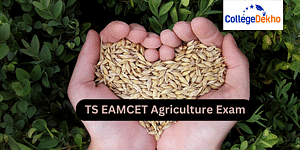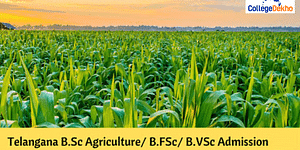BSc Agriculture Jobs
BSc Agriculture Jobs includes Plant Breeder, Seed Technology, Agriculture Officers, Assistant Plantation Managers, Agricultural Research Scientists, Business Development Executives, etc. There are various job options available after completing the BSc Agriculture course. Top recruiters like Advanta Limited, Rasi Seeds, DuPont India, Raghuvansh Agrofarms Limited, Rallies India Limited hire BSc graduates and pay decent salaries.
BSc Agriculture Jobs Overview
The BSc Agriculture course is a four-year undergraduate degree programme that aims to provide students with a thorough understanding of agricultural practices, technologies, and policies. Following the completion of the course, many candidates choose to pursue careers in their preferred fields. BSc Agriculture job opportunities in the agricultural sector are rapidly expanding due to the demand for trained professionals to apply cutting-edge farming techniques and technology designed to increase yield productivity. Candidates with a BSc Agriculture degree have many career options such as to work as an Agriculture Officers, Assistant Plantation Managers, Agricultural Research Scientists, Business Development Executives, Marketing Executives, and in other roles. Cargill, Bayer, Syngenta, and other multinational corporations are among the leading BSc agriculture recruiters. The starting BSc Agriculture salary ranges between INR 3.40 and INR 5.20 LPA, increasing with experience.
The BSc Agriculture programme prepares students with knowledge and abilities useful in the agricultural sector. BSc Agriculture subjects such as Horticulture, soil Science, Plant Pathology, Animal Sciences, Entomology, Plant Genetics, Plant Biochemistry, Agriculture Economics, and other subjects are taught to them both theoretically and practically to make them job ready. Students also learn about how to improve Crop Production and apply Modern Agricultural Techniques and Technologies such as Sowing, Irrigation, and Crop Protection from insects and pests.
To know more about BSc Agriculture Jobs, scroll down!
Table of Contents
BSc Agriculture Jobs Highlights
The following are some of the major highlights of BSc Agriculture jobs:
| Particulars | Details |
|---|---|
| Name of the Course | Bachelor of Science (BSc) Agriculture |
| Course Level | Undergraduate |
| Course Duration | 4 years |
| Average fee | INR 3.6 K to INR 9.6 LPA |
| Average annual salary | INR 3.40 - INR 5.20 LPA |
| Job Profiles | Assistant Managers, Land Geomatics Surveyors, Soil Forestry Officers, Soil Quality Officers, Plant Breeder/Grafting experts, etc. |
| Top Recruiters | Big Basket, JK Agri Genetics Limited, Raghuvansh Agrofarms Limited, Kaveri Seed Company Ltd., etc. |
Top BSc Agriculture Job Profiles
Here are some of the most sought BSc Agriculture jobs after listed below:
| Job Profile | Job Description |
|---|---|
| Agriculture Officer | An agriculture officer's clients are agriculture-related businesses and farmers. The primary responsibility of an agriculture officer is to provide leadership in order to increase agricultural productivity. |
| Assistant Plantation Manager | The assistant plantation manager is responsible for the efficient and profitable management of harvesting and other operations associated with crop or vegetable plantations. |
| Agricultural Research Scientist | Scientists in agricultural research begin with research. They are primarily interested in the biological processes of various things, as well as their interactions with products and processes. They consist of both lab and fieldwork. |
| Agriculture Development Officer | Like an agriculture officer, an agriculture development officer works to improve soil productivity and other agricultural practises. |
| Agriculture Technician | Agricultural technicians work in food, fiber, and animal research, production, and processing by developing techniques to increase crop yield and protect animals from disease. |
| Marketing Executive | A marketing executive promotes a product and creates sales strategies to draw customers and satisfy their needs in an effort to maximise profits. One of the most typical job profiles in the business world is this one. |
| Plant Breeder | To increase the yield of the main crops grown in India, plant breeders develop innovative techniques, devices, and technologies. |
| Seed Technologist | Seed technologists support seed growers by helping them with seed scouting, seed planting, and seed equipment operations. |
Top Academic Courses to Pursue after BSc Agriculture
BSc Agriculture graduates can choose from a wide range of occupations, including those in Management, Plant Breeding, Genetics, Soil Science, and Consulting for the Agricultural sector.
After pursuing BSc in Agriculture, ambitious students may decide to continue their education at the graduate level. They can select to specialise in MSc programmes in horticulture, Agriculture, Forestry, Plant Pathology, or other related fields. Those with a business-minded approach to the industry may decide to pursue an MBA in Agribusiness Management after earning a BSc in Agriculture. Those who want to work as agricultural scientists or in academia after earning a postgraduate degree in agriculture or a related field must decide between a PhD and an MPhil.
The top academic courses to take after a BSc in Agriculture are listed below:
- MBA in Agriculture
- Master’s in Environmental Agrobiology
- MSc in Agriculture
- MBA in Agribusiness
- MSc in Plant Pathology
- Master’s in Sustainable Agriculture
- MSc in Agricultural Economics
- MSc Agric in Genetics
- Master’s in Agricultural Engineering
- Master’s in Agroecology
- Master’s in Plant Science
- Master’s in Agronomy
- Master of Food Science and Agribusiness
- MSc Genetics and Plant Breeding
Job Opportunities after BSc Agriculture
Graduates with a BSc Agriculture have a wide range of employment options in India's public and private sectors, including positions as research Officers, Quality Assurance Officers, Agriculture Officers, Agriculture Loan Officers (In banks), Development Managers, Logistics Managers, and Farm Managers for State Agriculture departments. They can earn a lucrative BSc Agriculture job with a good salary.
The following is a list of job options after BSc agriculture that include the BSc Agriculture career scope:
- Agriculture Officer
- Agriculture Technicians
- Plant Breeder
- Assistant Plantation Manager
- Agricultural Research Scientist
- Business Development Executive
- Marketing Executive
- Seed Technologists
- Assistant Plantation Manager
- Seed Officer
- Agricultural Research Officer
BSc Agriculture Employment Areas
Graduates of the BSc in Agriculture have employment opportunities in both the public and private sectors. Due to the programme's breadth, graduates of the BSc in Agriculture will be employed by state agriculture departments as research officers, quality assurance officers, agriculture officers, agriculture loan officers (in banks), development managers, logistics managers, and farm managers. They can support themselves well.
Following are some of the major fields where graduates of BSc Agriculture can find employment. Career options after BSc agriculture are:
- Pharmaceutical Companies
- Chemical Companies
- Academic institutions
- Public Relations
- Actuaries
- Research Centers
BSc Agriculture Top Recruiters
The following are the top recruiters for BSc Agriculture graduates:
- Big Basket
- JK Agri Genetics Limited
- Raghuvansh Agrofarms Limited
- Kaveri Seed Company Ltd.
- DuPont India
- Rallies India Limited
- Advanta Limited
- National Agro Industries
- Rasi Seeds
- ABT Industries
- Phalada Agro Research Foundation Limited
Lastly, BSc agriculture jobs and salaries can vary depending on a number of factors, including the market, the industry, the job role, and skills. The likelihood of better pay and a higher BSc agriculture salary in India increases exponentially as an aspirant accumulates years and experience.
FAQs about B.Sc Agriculture Jobs
Is a BSc Agriculture degree in high demand?
They can work in a wide range of industries. Graduates are in high demand everywhere from agricultural farms to educational institutions, food processing plants, financial institutions, and research facilities.
What is the highest-paying BSc Agriculture job?
Top Highest paid jobs in Agriculture for a future career are:
- Manager of Agricultural Operations
- Scientist in the field of Food
- Manager of Agronomy Sales
- Engineer in Agriculture
- Economist specialising in Agriculture
- Agricultural Attorney
Is a BSc Agriculture degree worth the money?
A BSc in agriculture can expect to earn between INR 2.5 and 6 LPA on average. This figure is affected by factors such as college, professional position, experience, and skills. With a few years of experience in the field, earning up to INR 6 LPA may be possible.
What is the career after BSc in Agriculture?
Given below is a list of the best job sectors after a BSc Agriculture degree:
- Government Research Institutes
- Food Processing Units
- Central & State Government Departments
- Seed Manufacturing Companies
- MNCs
- State Agricultural Universities (SAUs)
- Fertilizer Manufacturing Firms
- Schools & Colleges
- Banks
- Machinery Industries
Which is preferable, a BSc in agriculture or a B Pharm?
B Pharmacy is a good option for you if you are leaning towards studying Pharmaceutical Science rather than choosing the demanding study of medicine and surgery. On the other hand, you should pursue a BSc in Agriculture if you're interested in learning more about modern agricultural practises and sciences.
Does a degree in agriculture pay well?
For graduates from India, the typical entry-level BSc Agriculture salary in India is about INR 35,000 per month. Payscale is the source. The job sector, experience, individual knowledge, expertise, and skills are just a few of the factors that affect the monthly salary for BSc Agriculture jobs in India.
What is the highest-paying BSc Agriculture job?
Among the highest-paying agricultural jobs are: Farm manager, Forester, Agricultural specialist, Water treatment specialist, Food technologist, Environmental scientist, Water resources engineer, Operations manager, etc.
What are the jobs for a BSc Agriculture degree?
Graduates with a BSc in agriculture have a wide range of employment options in India's public and private sectors, including positions as research officers, quality assurance officers, agriculture officers, agriculture loan officers (in banks), development managers, logistics managers, and farm managers for state agriculture departments.
Can I study btech after BSc Agriculture?
Yes, you can pursue agriculture engineering after earning a BSc in agriculture, but you would only be able to enrol in BTech Agriculture's second year.
Can I become an engineer after BSc Agriculture?
Given that agriculture is thought to be the foundation of the Indian economy, this field offers a flourishing career to aspirants. Through a variety of technical courses, including diploma, BTech, BE, and MTech programs, one can learn about this area of engineering.
Can I get a bank job after BSc Agriculture?
Yes, BSc Agriculture graduates are given a great opportunity by the Institute of Banking Personnel Selection (IBPS) to work as Agriculture Field Officers in public sector banks. (AFO or AO). Each year, the IBPS SO exam is held to select AOs for various PSU banks.
What are the govt jobs after BSc Agriculture?
Some of the most common government jobs sought by BSc Agriculture students are: Agriculture Forest Officer, Forest Officer, Graduate Trainee in Agriculture, Officer in Charge of Agriculture, Junior Engineer in Agriculture, Researcher, Assistants in the laboratory, Agricultural Development Officer.
Is BSc Agriculture a good career option?
Yes, pursuing a career in BSc agriculture opens up opportunities in a variety of industries. You can work in the public and private sectors, as well as research institutes, state agricultural universities, agricultural firms, and financial institutions.
Which course is best after BSc Agriculture?
Following a BSc in agriculture, students may choose from a variety of courses, including the Master of Food Science and Agribusiness, MBA in Agribusiness, MSc in Plant Pathology, MSc in Sustainable Agriculture, MSc in Agronomy, MSc in Agricultural Economics, MSc Agric in Genetics, etc.
















